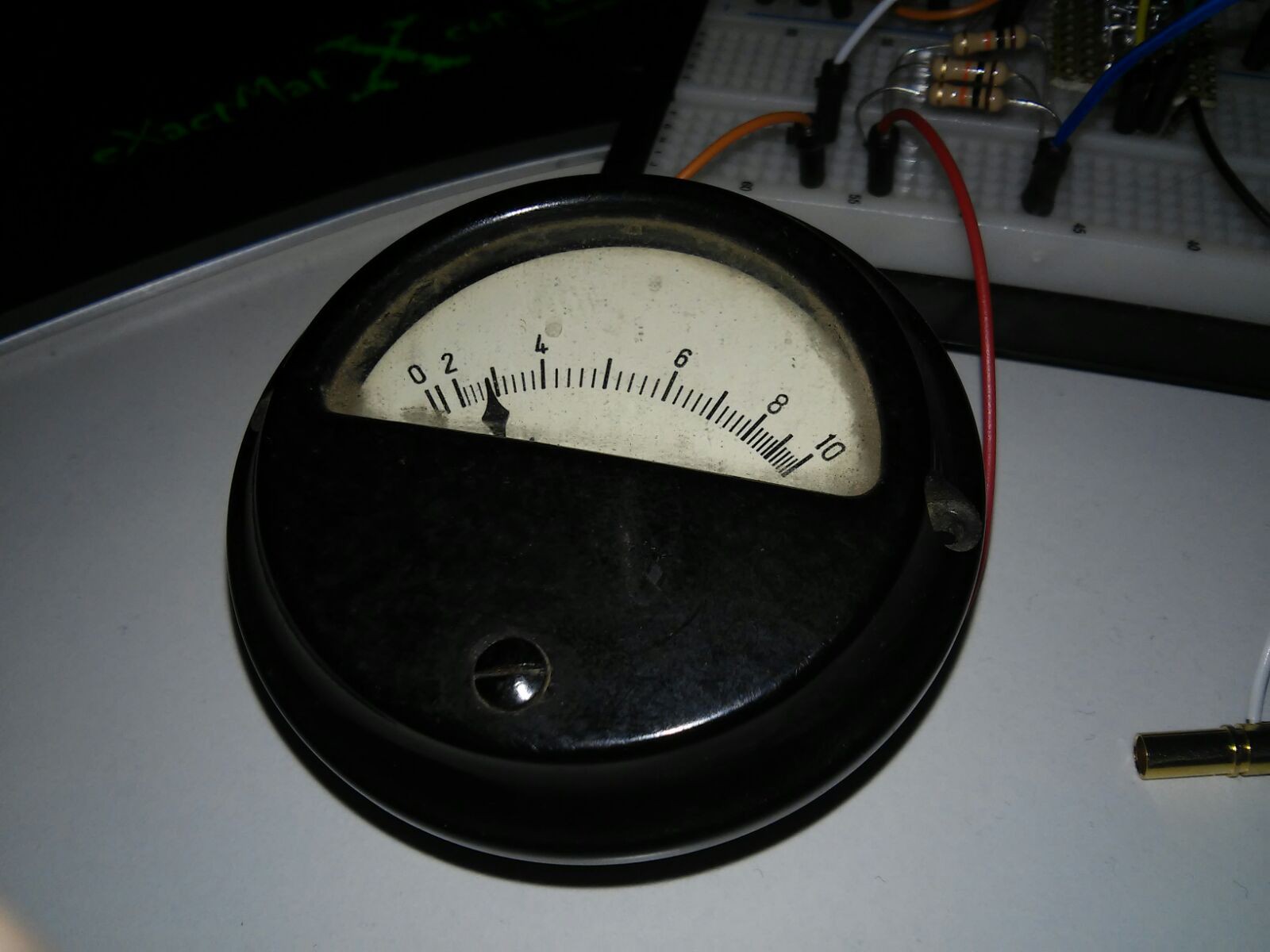Finaly i had the mood and time to try one of the Analog Gauges. Please read more to find out more ;)

I created the following Arduino Code. Its not to difficult to read and awesomely short.
I just thought about Eliots Blog Post about State Machines and decided, that i have to sleep over it ;) (Even not sure if possible to use with Arduino...)
/*
* Increasing and Decreasing Analog Gauge Value via PWM
* Analog Gauge is attached to pin 9 in series with a ~ 3.3K resistor
* Crted by Stefan-Xp
*/
const byte GaugePinNo = 9; // Pin which the Gauge is connected to
const int GaugeDelayBetweenSteps = 50; // Time Delay, which is taken between the Value changes
byte GaugeValue = 0; // Actual Gauge Value
byte State = 0; // Actual State: 0 = Count up, 1 = Count down
void setup() {
// Set the Pin to Output
pinMode(GaugePinNo, OUTPUT);
// Initialise Serial Port
Serial.begin(9600);
Serial.println("Analoginstrument Test");
}
// This function writes the Value to the Output and prints the Value via Serial
byte write_Value (byte Value)
{
// Set PWM Value
analogWrite(GaugePinNo, Value);
// Write Data on Serial Port
Serial.print("Value: ");
Serial.println(Value);
// Select next State ...
if (Value == 0)
State = 0; // Value reached 0, so beginn to count up
if (Value == 255)
State = 1; // Value reached 255, so beginn to count down
}
void loop()
{
// Decide if should count down or up
if(State)
GaugeValue--;
else
GaugeValue++;
// Execute
write_Value(GaugeValue);
// Wait for next Cycle
delay(GaugeDelayBetweenSteps);
}Schematic of the Circuit:

Video of the Moving Gauge Value:
 Stefan-Xp
Stefan-Xp
Discussions
Become a Hackaday.io Member
Create an account to leave a comment. Already have an account? Log In.
Yay, awesome! What's the purpose of the resistor? And what is the analog gauge used before?
Are you sure? yes | no
The resistor limits the flowing current? Its almost the same principle as @esot.eric proposed... ;)
I have no clue what it was used before... it says "Antennenstrom" (en: ~ Antennacurrent) on the Display.
Are you sure? yes | no
current... that's what I was asking for, thanks :) so 5V / 3.3kOhm is 1.5mA (looks like the same value written in your schematics) and if it is a current meter, it would relate to that? But why does the meter show a scale up to ten then? I'm confused.
Are you sure? yes | no
I don't know... in general all Drehspulanzeigeelemente show a value related to the flowing current.
Would be interessting to know where that Gauge was used and what for.
Are you sure? yes | no
I think they usually work on very low current... doesn't take much magnetic force to move a needle ;)
Glad to see this working, I'm inspired to do something now! Actually, have been recently contemplating messing around with the pick-up heads on old DVD/CD drives, or possibly the head on a hard-disk, which work nearly identically to these gauges (but don't look nearly as cool).
Nicely done :)
Are you sure? yes | no
Thank you! Now i just need to think about a project with those ;)
Are you sure? yes | no